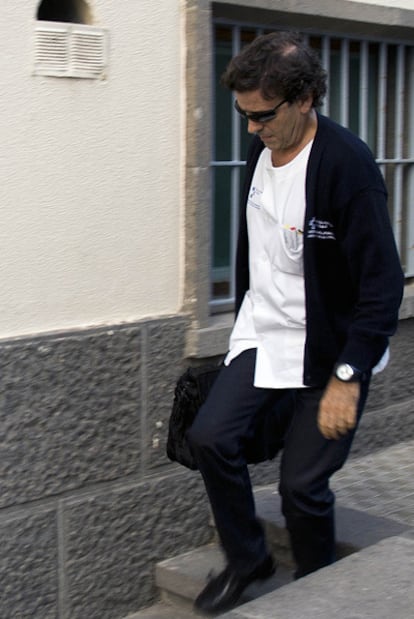Domínguez believed to be linked to Puerto doping case
Judge believes coded blood bag found during 2006 operation belongs to athlete
Operation Puerto, a 2006 Civil Guard investigation into a doping ring based out of Madrid, left the door ajar for last week's Operation Greyhound, some of the main protagonists of which are linked to both scandals. It has now emerged that one of the primary reasons a judge in the capital, Mercedes Pérez Barrios, authorized the wiretaps and surveillance that preceded Greyhound was a bag of blood found during Puerto that was not identified at the time, but which is believed to belong to Marta Domínguez.
The Central Operative Unit officers that launched Greyhound reached this conclusion after lengthy analysis of documents seized from Eufemanio Fuentes during the 2006 operation. Fuentes, a sports medic accused of running Puerto out of his Madrid clinic, is also one of the key suspects in Greyhound.
Operation Puerto documents contained the runner's cellphone number
In one of the documents, which identifies the athlete receiving a program of doping by a codified name, Domínguez's cellphone number is also present. Associated with the paperwork was a bag of blood that carried the same codified name on an identifying label; investigators believe this blood bag corresponds to Domínguez.
Judge Pérez Barrios, who is overseeing Operation Greyhound, will hear Domínguez's declarations in due course - the judge has been on sick leave - and she may choose to call the athlete to Madrid rather than permit a video conference from Domínguez's hometown, Palencia, due to the seriousness of the allegations.
The other seven suspects detained in the operation - Fuentes, Manuel Pascua, César Pérez, Alberto León, José Alonso Valero, María José Martínez and Alberto García, who all face charges of crimes against public health - gave testimony to the judge substituting Pérez Barrios in the capital.
Aside from being the principal driver of the initial investigation, the attribution of the blood bag to Domínguez, who won the 5,000m European title in Gothenburg a few months after the Puerto scandal broke, also leaves question marks hanging over her achievements on the track.
In a statement released on Monday, Domínguez vehemently denied supplying other athletes with doping substances and also refuted claims that the Civil Guard had found prohibited products in her home. However, she fell short of affirming that she had never taken performance-enhancing drugs herself.
That Fuentes was working with Domínguez was confirmed recently by her former coach, Mariano Díez. Shortly before the Beijing Olympics, Domínguez appointed César Pérez. Díez later revealed that Domínguez had told him years before that she had been in a working relationship with Fuentes since at least 2003.
"When I asked her, at the same time that Puerto broke in 2006, whether she was worried if she was implicated, she replied: 'Don't worry, Mariano. Nothing is going to happen to me'," Díez said on a radio program last week.
Fuentes, who in addition to his involvement in Operation Greyhound, is awaiting a court appearance over his links to Puerto, returned to work on Monday as a family doctor at a Canary Islands public health center. He flew back to the Canaries on Sunday after being arrested on an airplane a couple of hours after his Las Palmas apartment had been searched by the Civil Guard.
Meanwhile, investigators are waiting for the results from several laboratories studying the substances uncovered at 15 separate addresses last Thursday when Greyhound sprang from the traps.

"I don't understand; sport is my life"
Marta Domínguez, Spain's most decorated athlete, could be stripped of her titles "if it is proven irrefutably, or that she confesses, that she has used banned substances from a particular date," Spanish Athletics Federation president José María Odriozola said on Monday.
The same day, Domínguez spoke to news agency Efe, refuting the presence of banned substances in her house but not denying outright having taken performance-enhancing drugs.
"Of course I have never supplied doping products. Up to this point, nobody has told me what proof they have against me. After eight months of investigation, the Civil Guard told me on Thursday that I am simply a witness in this process. Who decided, and why, I should become a suspect and not a witness when no prohibited substances were found in my house? When the Civil Guard asked to search my house, I cooperated fully. For more than four hours officers searched my house and didn't find any trace of banned substances. Everything that has appeared in the media to the contrary is completely false.
"At this time I understand everything but comprehend nothing. I don't know if I am accused of doping or something more serious, of supplying substances, damaging the health of my colleagues and putting their lives at risk by selling doping products [or] if they are accusing me of amassing a fortune at the cost of my colleagues' health. Is there a worse accusation against a person who has made sport her life?"
Tu suscripción se está usando en otro dispositivo
¿Quieres añadir otro usuario a tu suscripción?
Si continúas leyendo en este dispositivo, no se podrá leer en el otro.
FlechaTu suscripción se está usando en otro dispositivo y solo puedes acceder a EL PAÍS desde un dispositivo a la vez.
Si quieres compartir tu cuenta, cambia tu suscripción a la modalidad Premium, así podrás añadir otro usuario. Cada uno accederá con su propia cuenta de email, lo que os permitirá personalizar vuestra experiencia en EL PAÍS.
¿Tienes una suscripción de empresa? Accede aquí para contratar más cuentas.
En el caso de no saber quién está usando tu cuenta, te recomendamos cambiar tu contraseña aquí.
Si decides continuar compartiendo tu cuenta, este mensaje se mostrará en tu dispositivo y en el de la otra persona que está usando tu cuenta de forma indefinida, afectando a tu experiencia de lectura. Puedes consultar aquí los términos y condiciones de la suscripción digital.








































